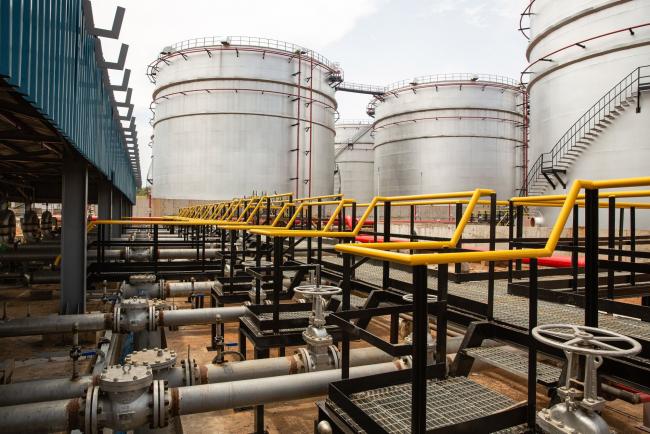

fetching latest news
News tagged in:

US product exports have accelerated to a record in recent weeks while crude imports have decelerated to the slowest rate for decades, according to data from the US Energy Information Agency (EIA).

Higher net crude oil imports are set to make the United States a net petroleum importer this year again, as in 2021, after a historic shift of being a net petroleum exporter in 2020, the U.S. Energy Information Administration (EIA) said on Friday.

(Bloomberg) -- Oil settled at the highest level in nearly a month after U.S. crude stockpiles decreased and economic data pushed equities higher. West Texas Intermediate futures rose 2.3%, closing above $72 for the first time in two weeks. Prices got a boost after the Energy Information Administration reported crude inventories declined 4.72 million barrels last week. Meanwhile, rising home sales and consumer confidence signaled economic strength, blunting worries about omicron’s impact. “The report was modestly bullish, due to the large crude oil inventory drawdown,” said John Kilduff, a partner at Again Capital LLC. Though he cautioned crude oil inventories typically decline this time of year for tax avoidance purposes.

Crude oil prices recovered somewhat on Wednesday morning after the Energy Information Administration reported an inventory draw of 4.6 million barrels for the week to December 10. At 428.3 million barrels, crude oil inventories remain 7% below the five-year average. Last week’s draw compares with a modest 200,000-barrel decline in crude oil inventories for the previous week. On Tuesday, the American Petroleum Institute estimated a crude oil inventory draw of 815,000 barrels for the week to December 10. In fuels, the agency reported draws.

U.S. coal stockpiles fell in September 2021 to the lowest level of total monthly coal stocks at the electric power sector since at least 2001, the Energy Information Administration (EIA) said in an Electricity Monthly Update of its November report this week. High natural gas prices have been driving increased use of coal for power generation at utilities in recent months, while the supply response has been muted due to closures of coal mines in recent years. So in September, total U.S. coal stockpiles saw a month-over-month decrease of 4.8 percent, reaching 80 million tons, the EIA said.

Oil jumped on speculation that the Biden administration may pull the plug on any plans to release crude from the nation’s emergency reserves after a U.S. energy report showed supplies rising next year. Futures in New York closed 2.7% higher on Tuesday. The Short-Term Energy Outlook predicted that the market will be oversupplied early next year and prices will fall in December from current levels. The White House said it welcomed the EIA’s forecast of oil prices moderating and will not be announcing an oil release from the nation’s Strategic Petroleum Reserves today.

Oil prices in the international market dropped today over signs of increasing supply and rising concerns of weak demand due to global economic slowdown. Benchmark Brent crude futures contract fell 0.61%, and were traded at $74.58 per barrel. US WTI crude futures dipped to $64.90 a barrel. Data releases by EIA yesterday showed a climb in crude oil inventories for a sixth straight week.

Concerns over slower global economic growth sent oil prices down for another time this week. Brent crude oil futures LCOc1 were down at $71.38 per barrel. U.S. West Texas Intermediate (WTI) crude futures CLc1 dropped to $65.42 a barrel. Data released on Wednesday showed crude oil output rose by 100,000 barrels per day to 10.9 million bpd in the week ending Aug 10.

Oil Prices edged up today after the last couple of days saw a decline in the crude costs. Brent crude futures LCOc1 rose by 0.4%, at $72.64 a barrel. West Texas Intermediate (WTI) crude CLc1 futures climbed 0.4%, to $67.92 a barrel. Energy Information Administration (EIA) reported U.S. crude inventories for the last week at 3.8 million barrels capacity, owing to a surge in import.

As the focus of investors shifted towards oversupply concerns, crude oil futures declined during mid-morning trade in Asia. Economists are raising concerns about oversupply risk stating that geopolitical risks are traditionally short-lived. Data from EIA shows a hike of 5.84 million-barrel in US crude stocks. Investors are worried that this increase in stockpiles might become a trend and so they are looking for fresh data from EIA this week.

The Permian shale play is all set to become the world’s largest oil patch over the next decade. According to the Energy Information Administration, output in the basin is forecast to reach 3.18 MMbpd in May.The oil reserve size with enhanced technology and efficiency are fueling the rampant growth.

According to the U.S. Energy Information Administration (EIA) report, the exports of U.S. liquefied natural gas (LNG) increased from 0.5 Bcfd in 2016 to 1.94Bcfd in 2017. Shipments went to more destinations with an expansion in LNG exports. All LNG exports from US in 2017 originated from Louisiana’s Sabine Pass liquefaction terminal and reached almost 25 nations with 53% shipped to three countries- Mexico, South Korea and China.

The U.S. Energy Information Administration (EIA) has recently said in a monthly productivity report that U.S. shale production is expected to rise to a record high 6.95 million bpd in April. The report highlights that the expected increase is majorly driven by production gains in oil in the Permian and Eagle Ford formations. However, enhanced crude supply in the US is seen as a potential threat to global supply balance.

As reported by Reuters, Brent crude prices slipped back consecutively for a second day owing to weak economic figures from China and growing U.S. oil inventories. Traders across the globe expressed their concern regarding an international economic slowdown as China reported that factory growth has sunk to its lowest rate since 2016.